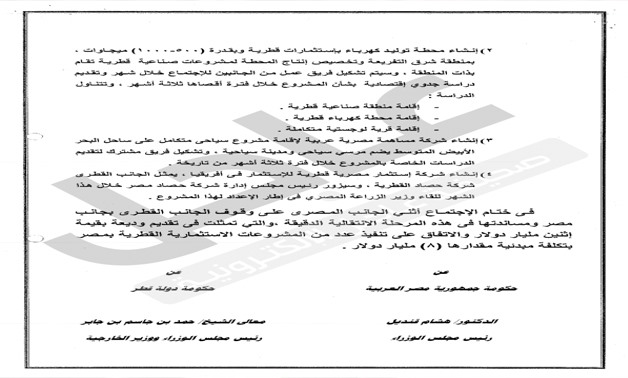
Qatar leaks obtained by Saudi newspaper Ajel
CAIRO – 7 June 2017: During former Islamist President Mohamed Morsi’ one-year tenure, Qatar has sought to control over the Egyptian economy and to thwart a Saudi initiative undertaken by late King Abdullah bin Abdelaziz Al-Saud for countering sectarian sedition, according to classified documents leaked from the office of Qatar’s former Prime Minister Hamad bin Jassim bin Jaber bin Mohammed bin Thani Al-Thani.
The leaks, which obtained by Saudi newspaper Ajel, revealed that Qatar has sought to be the largest lender to Egypt; as per an accord between the former prime minister and the government of the outlawed Muslim Brotherhood, Egypt could grant Qatar the right to invest in the Cairo International Airport, to lease part of the airport for the Qatar Airways, and to accelerate the issuance of permits to any Qatari aircraft to cross Egyptian airspace.
The accord was reached in August 2012, also discussed granting Qatari Diar Co. the right to invest in Egypt and extending its project in Egypt to 12 years instead of eight years, and ending all obstacles that face the Qatari company’s work in Egypt, the leaks added.
As per the accord, Qatar aimed to control the Egyptian iron sector through the establishment of a company called "Qatar Steel." It also agreed on establishing a power plant with a capacity of between 500 and 1000 MW, on the condition that the power production shall feed Qatar’s projects in the East of Port Said city, which locates on the entrance of Suez Canal, the leaks continued.
Qatar has also planned to control Egypt's tourism sector by establishing an integrated tourist city, a tourist marina and an integrated logistics village, according to the files; both sides also had reached a deal, via which Qatar would provide Egypt with LE 10 ($551 million) to 20 billion in loans.
During Morsi’ tenure, Qatar had already given Egypt $7.5 billion in loans and grants but relations between the two countries tensed due to Qatari opposition to Morsi’s ouster in 2013.
Following an Egyptian million-man demonstration against Morsi’s regime on June 30, 2013, the former Islamist President was ousted. Except for the Brotherhood-aligned Qatar, most Gulf countries were pro-Egyptian military and supported the people’s will to start a new path to democracy, particularly Saudi Arabia and the UAE, which pledged billions in emergency aid to Egypt.
Morsi is being re-tried over charges of espionage for Qatar as he and other six con-defendants accused of leaking confidential documents of the state’s national security and Egyptian armed forces to Qatari T.V. channel of Al Jazeera during Morsi’s tenure.
‘Resisting anti-sectarian sedition call’
The leaked documents disclosed that Qatar tried to resist, through the Brotherhood ally, a call made by Saudi late King Abdullah bin Abdelaziz for opening a dialogue between the different Islamic sects to counter the sectarian violence in the region.
According to the leaked documents, Qatar “exploited” its influence of its Islamist allies in the Arab Spring countries, particularly Egypt, to abort the Saudi King’s efforts.
Al-Thani asked Morsi to make the outlawed Muslim Brotherhood to work against the Saudi initiative, which has been issued by the late King during the 2012 Islamic Solidarity Summit, the document revealed.
On August 16 2012, Late King Abdullah has launched a ten-pillar initiative for countering the sectarian sedition in the Muslim world, saying that the Islamic nations should “stand united in the face of ethnic-or-sectarian sedition which started to spread in the Islamic body.”
In the 2012 summit convened in Riyadh, the late king also has called for establishing a center of dialogue between Islamic schools, the initiative that was welcomed by all Islamic states’ leaders. However, the leaked files said that the Qatari prime minister held several meetings with Muslim Brotherhood leaders and Egyptian pro-Brotherhood officials to thwart the Saudi initiative.
Due to Qatar’s support to the “terrorist groups,” Egypt, Saudi Arabia, the UAE, and Bahrain
on Monday cutting their diplomatic ties with Qatar, and closing their airspace and seaports for the Qatari transportation on Monday. The four Arab countries withdrew their diplomatic missions from Qatar.
Other countries, like Yemen, eastern government of Libya, Mauritius, and Maldives severed their ties with Qatar as well; Jordan downgraded its diplomatic representation with Qatar on Tuesday.
Tensions between Qatar and the other Arab Gulf states strained after Qatari Emir Tamim bin Hamad Al-Thani directed a message to four Arab countries - Egypt, the UAE, Saudi Arabia and Bahrain that “being hostile to Iran is unwise.”
His remarks were stated following the American-Arab-Islamic summit which was held in Riyadh between Saudi King Salman bin Abdulaziz, U.S. President Donald Trump, President Abdel Fatah al-Sisi and King Abdullah II of Jordan in mid-May. The four leaders announced their integrated efforts to fight terrorism in the region and the world, agreeing on confronting the growing Iranian threat in the Middle East and inaugurating the Center for Combating Extremist Ideology to monitor and fight extremism.








Comments
Leave a Comment